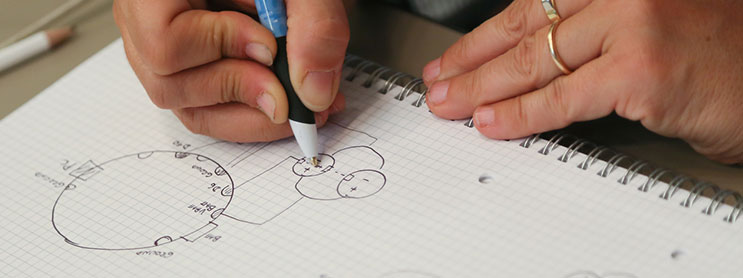
The project developed resources for educators and adult learners that helped build self-confidence, supported lifelong learning, contributed to the development of 21st Century skills, and encouraged the exchange of expertise and practice across the community and informal learning spaces such as libraries, museums, and science centres.
During its lifetime, the project produced the following tools:
RESOURCES
- Field Observation Grids for librarians and science educators
Tool for observation and evaluation of inclusion and diversity in science education activities and librarian practice. Intended both for librarians and science educators.
Download (TinkerLib-Cross_observation_grid_VF.pdf | 317kB) ->
- The Map-Guideline of Inclusive Practices
Practical and reflective resource developed within the TinkerLib project, which brings together libraries and science education organizations to foster more inclusive and engaging learning environments for underrepresented adult learners. Based on collaborative discussions and in-depth observations across partner institutions, the guideline identifies four key aspects of inclusion—diversity, belonging, equity, and privilege—as its foundational pillars. Rather than offering fixed solutions, it provides a flexible framework designed to support educators and facilitators in evaluating and enhancing the inclusivity of their activities. Intended for both TinkerLib partners and the wider informal education community, this tool encourages ongoing co-creation with learners to ensure educational experiences are meaningful, accessible, and responsive to diverse needs.
Download (TinkerLib-The_Map_Guideline_of_Inclusive_Practices-long.pdf | 6.6mB) ->
Below you can find the translations of the short Map-Guideline of Inclusive Practices in the partner languages.
- Methodological Kit
The Methodological Kit is both a practical and a reflective resource for educators, librarians, and museum facilitators who wish to co-design inclusive Tinkering experiences with adult learners. It documents the co-creation processes and insights developed throughout the project, promoting a shift from delivering activities to engaging participants as co-designers in creative, equity-driven learning environments. The recommendations are grounded in the lived experiences of the TinkerLib partners and are meant to inspire further reflection, adaptation, and growth.
- Activity Kit
The Activity Kit showcases six hands-on activities co-designed by libraries and science engagement settings in collaboration with communities including migrants, seniors, autistic adults, rural residents, and incarcerated learners. Each activity includes step-by-step guidelines and adaptation tips, offering educators a practical, inclusive framework to implement and reimagine Tinkering across diverse learning contexts. While rooted in real experiences, the activities are not an exhaustive guide and may need to be adapted to fit specific institutional, cultural, or logistical settings.
DISSEMINATION EVENTS
Dissemination events served as a platform to share and disseminate information, ideas, and materials created during TinkerLib. They reached a broader audience, raised awareness, and engaged a wide range of diverse stakeholders.
Local dissemination events took place in the summer 2025 in all partner countries:
- Austria, organized by SCN.
- France, organized by Traces.
- Italy, organized by MUST.
- Serbia, organized by CPN.
- The Netherlands, organized by NEMO.
In addition, a European Dissemination Event took place online on September 16th, 2025.
You can access the event recording here →
You can find the Workshops Synthesis here →


